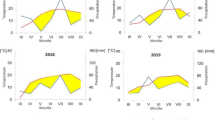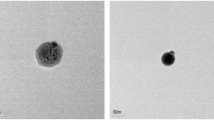Abstract
A PHYSIOLOGICAL disorder of rice known as ‘suffocation disease’ occurs on the poorly drained soils of northeastern Taiwan. The disease, which is characterized by a reddish-brown discoloration of the older leaves, stunted growth, root rot, and low yield, has been attributed to excessive reduction of the soil1,2. As the recommended remedy3 of draining the fields to facilitate oxidation of the soil by atmospheric oxygen is not feasible during the rainy season, chemical retardation of reduction of the soil was investigated in a greenhouse experiment.
This is a preview of subscription content, access via your institution
Access options
Subscribe to this journal
Receive 51 print issues and online access
$199.00 per year
only $3.90 per issue
Buy this article
- Purchase on Springer Link
- Instant access to full article PDF
Prices may be subject to local taxes which are calculated during checkout
Similar content being viewed by others
References
Chang, S. C., Soils Fert. Taiwan, 1 (1961).
Chiu, T. F., Soils Fert. Taiwan, 5 (1961).
Takahashi, J., Soils Fert. Taiwan, 10 (1961).
Ann. Rep., 1964. Int. Rice Res. Inst., Los Banos, Laguna, Philippines.
Author information
Authors and Affiliations
Rights and permissions
About this article
Cite this article
PONNAMPERUMA, F., YUAN, W. & NHUNG, M. Manganese Dioxide as a Remedy for a Physiological Disease of Rice associated with Reduction of the Soil. Nature 207, 1103–1104 (1965). https://doi.org/10.1038/2071103a0
Published:
Issue Date:
DOI: https://doi.org/10.1038/2071103a0
Comments
By submitting a comment you agree to abide by our Terms and Community Guidelines. If you find something abusive or that does not comply with our terms or guidelines please flag it as inappropriate.



